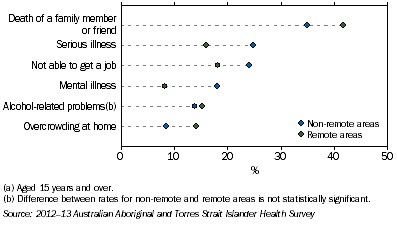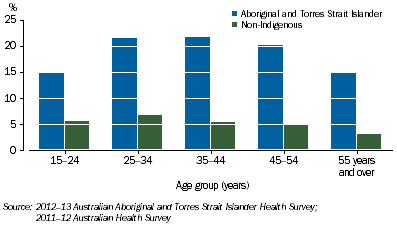FAMILY STRESSORS
Stress can impact on quality of life and, if ongoing and untreated, can be a catalyst for a range of serious illnesses from anxiety and depression, to hypertension and chronic immune related illness.
RESULTS FROM 2012–13
In 2012–13, almost three-quarters (73%) of Aboriginal and Torres Strait Islander people aged 15 years and over reported that they, their family or friends had experienced one or more stressors in the previous year.
A significantly higher proportion of Aboriginal and Torres Strait Islander females than males reported one or more stressors (77% compared with 70%).
The most commonly reported family stressors in the Aboriginal and Torres Strait Islander population were the death of a family member or friend (37%), a serious illness (23%), inability to get a job (23%), and mental illness (16%). These were the most prevalent stressors for both Aboriginal and Torres Strait Islander males and females. Similar proportions of males and females reported serious illness (22% and 24% respectively) and/or inability to get a job (23% and 22% respectively) as family stressors. However, females were significantly more likely than males to have reported the death of a family member or friend (39% compared with 34%) and/or mental illness (19% compared with 13%). In addition to the four most prevalent family stressors, around one in eight males (12%) reported trouble with the police, 12% cited alcohol-related problems, and 9% the involuntary loss of a job. For females, the other most commonly reported family stressors were alcohol-related problems (16%), pregnancy (14%), and drug-related problems (13%).
Within the Aboriginal and Torres Strait Islander population, the death of a family member or friend was the most prevalent stressor in every age group, reported by 31% of people aged 15-24 years to 42% of those aged 45-54 years. For almost one-quarter (24%) of young people aged 15–24 years, not being able to get a job was the next most frequently reported stressor, followed by serious illness (19%), pregnancy (16%), mental illness (12%), and trouble with the police (11%). Among Aboriginal and Torres Strait Islander people aged 25 years and over, the next most frequently reported family stressors (after death of a family member or friend) were serious illness, inability to get a job, mental illness, and alcohol-related problems.
A significantly higher proportion of Aboriginal and Torres Strait Islander people in non-remote areas than in remote areas reported having experienced one or more stressors in the previous year (75% compared with 69%). For Aboriginal and Torres Strait Islander people in both non-remote and remote areas, the three most prevalent stressors were the death of a family member or friend, serious illness, and inability to get a job.
A higher proportion of Aboriginal and Torres Strait Islander people in remote areas than in non-remote areas cited the death of a family member or friend (42% compared with 35%) and/or overcrowding at home (14% compared with 9%) as family stressors, while people in non-remote areas were significantly more likely than those in remote areas to have reported serious illness (25% compared with 16%), inability to get a job (24% compared with 18%), and/or mental illness (18% compared with 8%).
COMMON STRESSORS BY REMOTENESS, Aboriginal and Torres Strait Islander people(a)—2012–13

Similar proportions of Aboriginal and Torres Strait Islander people in remote areas and non-remote areas reported that alcohol-related problems (14% and 15% respectively), trouble with the police (12% and 14% respectively), and drug-related problems (12% and 10% respectively) had been stressors for them, their family or friends in the previous year
.
HOW DO THESE RATES COMPARE WITH THE RATES FOR NON-INDIGENOUS PEOPLE?
The 2012–13 Aboriginal and Torres Strait islander Health Survey and the 2011–12 National Health Survey both collected information on a common set of 13 family stressors
(Glossary).
After adjusting for differences in age structure between the two populations, Aboriginal and Torres Strait Islander people aged 15 years and over were
1.4 times as likely as non-Indigenous people to have experienced one or more of these specific stressors in the previous year.
In both the Aboriginal and Torres Strait Islander and non-Indigenous populations, the five most prevalent stressors were the death of a family member or friend, serious illness, inability to get a job, mental illness, and alcohol or drug-related problems.
After adjusting for differences in age structure between the two populations, Aboriginal and Torres Strait Islander people were considerably more likely than non-Indigenous people to have been affected by one or more of the five most common stressors. They were 3.6 times as likely to have reported alcohol and drug-related problems as a family stressor; 2.5 times as likely to have cited the stress of not being able to get a job; 1.9 times as likely to have reported the death of a family member or friend; 1.7 times as likely to have reported mental illness as a family stressor; and 1.4 times as likely to have said that serious illness had been a stressor for them, their family or friends in the previous year.
FAMILY STRESSOR: ALCOHOL AND DRUG-RELATED PROBLEMS, by Indigenous status and age—2012—13

 Print Page
Print Page
 Print All
Print All